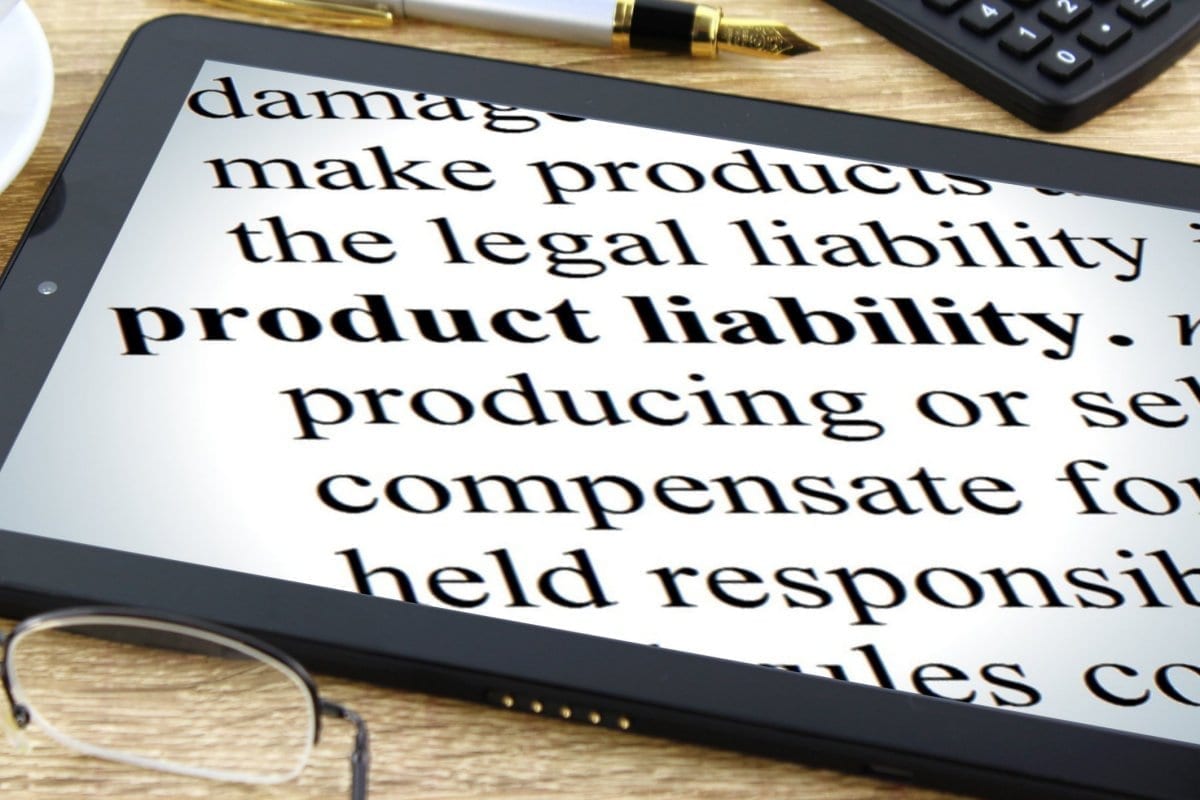Product liability cases are rarely as spectacular as the McDonald’s case, or the $28 billion case of United States v. Philip Morris Tobacco et al. But, if you’ve been injured or you’ve suffered loss due to a defective product, you deserve fair and thorough compensation.
Manufacturers put warning labels on their products and publish several pages of warnings in their user manuals, not so much out of concern for their customers, but to protect themselves in case something goes wrong, so that they can say, “I told you so.” They’re worded in a way that suggests that if consumers use their product the wrong way, and they get hurt, they have no one to blame but themselves.
Nice try. While warning labels provide a valuable service to consumers and should not be ignored, they don’t absolve the manufacturer of liability when mishaps occur. Manufacturers have a duty to consumers to not only produce safe and reliable products but to consider all foreseeable ways a product might be misused, and to design, produce and market their products with that in mind.
If you are injured by a product, whether it broke, was defective in some manner, didn’t behave as expected or did something you weren’t adequately warned about, you might have a product liability case. Even if you are partially to blame, don’t let that deter you. Contact a defective product lawyer and schedule a consultation – chances are it will be free – and let him or her advise you on the next step.
The Basics of a Product Liability Claim
In a civil suit, the burden of proof rests with the plaintiff. For a product liability case, you need to provide documentation and testimony that will prove these salient points:
Proof That You Were Injured by the Product
There are actually three points within this one concept.
- You must first prove that you were injured. Doctor bills, hospital bills, physical therapy bills, and any bill relating to your medical care are admissible as proof and as a means of tabulating your claim.
- You must prove that the product caused your injury.
- You must prove that the specific defect regarding the product was what caused your injury. A defect can be a missing, unclear, or insufficient warning label.
Negligence
Negligence is the failure to apply ordinary care to the production, design and transporting of goods. It doesn’t matter if the negligence is intentional or accidental. The manufacturer and everyone in the chain of distribution should use reason and appropriate diligence to ensure that the product works as it’s supposed to and poses no threat to the consumer.
To see a problem on the assembly line and make no attempt to try to remedy it is negligence. To notice a glitch in the way a product functions and not attempt to correct it or redesign it is negligence. Failure to warn the consumer about a dangerous aspect of the product is negligence.
Breach of Warranty
The notion of warranty goes far beyond the small print on a piece of paper that’s stuffed into the box the product ships in. That slip of paper is known as the express warranty, which outlines in writing promises that the product will perform in a specified manner under specified conditions. Typically, express warranties carry provisions that state what the manufacturer will do if the product fails to live up to the specified attributes.
Anything not covered in writing, but which could reasonably be expected in a certain product is called the implied warranty. If you buy a circular saw, you would expect that it could cut a 2 x 4 and would continue to maintain that ability throughout the serviceable life of the saw. If you sold the saw at a yard sale, the new owner could also expect it to cut a 2 x 4.
The implied warranty not only includes an expectation that a product will be fit for a particular purpose, but that it would be safe to use if used in the manner the product is designed for. Under the concept of implied warranty, the manufacturer has the duty to envision ways that the product could be misused and make a reasonable attempt to prevent harm to the product or the user in those situations.
Any failure on the part of the manufacturer to honor a warranty, whether express or implied, is called breach of warranty.
When to Call a Product Liability Attorney
It’s not unreasonable to anticipate that your product liability claim will be trivialized by the manufacturer when you make initial contact. Most are. Therefore, it is important that you call an attorney as early as possible in the process.
When you file a claim against a manufacturer, your claim will likely be turned over to the insurance company that covers the manufacturer in liability cases. They will likely be quick to contact you to get the matter put away as soon as possible. They don’t want you to call an attorney, and will offer a lowball settlement offer, tell you they are paying the maximum allowable amount for your particular injury, put a deadline on the offer, and in general, anything they can think of to keep advantage on their side.
Why Hire a Product Liability Attorney?
You could represent yourself in a simple product liability case, but simple cases can turn complex quickly, often by design.
The insurance companies knows what they’re doing, and know that the average citizen doesn’t have the legal acumen to pose much of a challenge to their seasoned negotiators. They won’t hesitate to use tricks to confuse you, to extract contradictory statements from you, and to rob you of your confidence.
But, when a product liability attorney enters the discussion, things change. Lowball settlement offers get taken back, rewritten, and brought back to the table with more money attached. The condescending dialogue generally stops and they become far more cooperative. In product liability cases, the manufacturer or seller has an additional incentive to preserve its public image, and may be more willing to settle a case when it knows you mean business.
How Much Will a Product Liability Attorney Cost?
In nearly all product liability cases, even the best product liability attorneys do not charge fees up front, but take their fees from the settlement. Proponents of do-it-yourself courtroom litigation like to point out that you can keep all the settlement if you don’t hire an attorney. That is true, but what they fail to mention is that the legal fee is often added to the claim amount, so that the plaintiff and his attorney are fairly compensated.
Something else that the DIY proponents don’t tell you is that if you represent yourself, and you lose, you’re responsible for paying the opposing attorney’s fees.
Common Types of Product Liability Claims
Automotive

- SUV rollovers – Design defects that produce instability
- Failed passenger restraints – Air bags that fail to deploy or deploy spontaneously
- Structural integrity defect – (Also known as roof crush)
- Tires – Belt or tread separation
- Fuel System – Fire / explosion hazard
- Phantom acceleration – Car accelerates without driver input*
- Steering defects – Loss of power steering, vibrations, lack of steering response
- Brake defects** – Failure to deploy, uneven braking, overly aggressive braking
*This continues to be scrutinized by safety experts. Car manufacturers insist that all such claims are driver error.
**If brake defects are the result of a failure of maintenance, especially in the case of a trucking accident, this usually falls outside of a product liability claim
Power Equipment
- Tool failure – Parts breaking off, overheating, functioning in unexpected manner
- Lack of warning – Insufficient warning about the hazards, improper usage or improper techniques
Medications
- Defective manufacturing – Improper storage, unsanitary facilities, improper handling, and improper labeling
- Insufficient warnings and drug information – Side effects not sufficiently explained, explanation of how the drug works insufficient or missing
- Deceptive marketing – Selling or promoting a medication for symptoms it wasn’t developed to treat.
Food
- Spoiled food – Food stored at improper temperature, stored for too long
- Contaminated food – Food stored in the presence of contaminants, broken or torn packages
- Insufficient warnings – Failure to warn of allergens and hazards within the food, failure to warn of hot items
Children / Infant Products
- Toys – Manufacturing defects, design defects, and improper labelling can all result in a dangerous toy for children
- Other products – A defect in design or manufacturing most often applies here (examples include cribs, walkers, jumpers, etc.)
A Brief History of Product Liability Cases
1842 – Winterbottom v Wright (England)
This case established privity (inclusion in a contract) as a condition by which a product liability lawsuit can be filed. Without a contract, the victim cannot sue. This would later be superseded.
1916 – MacPherson v Buick Motor Company
The decades-long policy of privity as a requirement to suing over a defective product was eradicated by the decision in this case. MacPherson was able to collect for damages suffered when a defective wheel on his car broke. He sued Buick, even though he bought the car from a dealer and signed no contract with Buick.
1960 – Henningsen v. Bloomfield Motors Inc.
This case established the concept of strict liability as it applies to consumer products. Mr. Henningsen signed a warranty that placed limits on what would be covered in case of product failure on his car. The court ruled that the signed warranty did not take precedence over strict liability. The manufacturer and seller were obligated to provide a product that fulfilled the expectations of that product, even if not expressed in writing.
1992 – Liebeck v. McDonald’s
McDonald’s failed to adequately warn that its coffee was served at 180°, which can cause severe burns in seconds. A history of complaints against the fast food restaurant led to a multi-million settlement, even though Mrs. Liebeck sought only compensation for her medical bills and lost wages.
Conclusion
Product liability cases are rarely as spectacular as the McDonald’s case, or the $28 billion case of United States v. Philip Morris Tobacco et al. But, if you’ve been injured or you’ve suffered loss due to a defective product, you deserve fair and thorough compensation.
Don’t delay, thinking that the manufacturer or seller of the product will do the right thing. They might, but they might not. Protect yourself and your family with the assistance of a product liability attorney.


Join the conversation!